
Rugby union football, commonly known simply as rugby union or more often just rugby, is a close-contact team sport that originated at Rugby School in the first half of the 19th century. Rugby is simply based on running with the ball in hand. In its most common form, a game is played between two teams of 15 players each, using an oval-shaped ball on a rectangular field called a pitch. The field has H-shaped goalposts at both ends.

Rugby sevens is a variant of rugby union in which teams are made up of seven players playing seven-minute halves, instead of the usual 15 players playing 40-minute halves. Rugby sevens is administered by World Rugby, the body responsible for rugby union worldwide. The game is popular at all levels, with amateur and club tournaments generally held in the summer months. Sevens is one of the most well distributed forms of rugby, and is popular in parts of Africa, Asia, Europe, and the Americas, and especially in the South Pacific.

The Georgia national rugby union team, nicknamed The Lelos, represents Georgia in men's international rugby union. The team is administered by the Georgian Rugby Union and takes part in the annual Rugby Europe Championship and the Rugby World Cup, which takes place every four years.
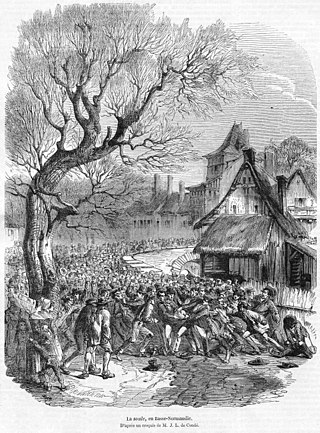
The history of rugby union follows from various football games long before the 19th century, but it was not until the middle of that century that the rules were formulated and codified. The code of football later known as rugby union can be traced to three events: the first set of written rules in 1845, the Blackheath Club's decision to leave the Football Association in 1863 and the formation of the Rugby Football Union in 1871. The code was originally known simply as "rugby football". It was not until a schism in 1895, over the payment of players, which resulted in the formation of the separate code of rugby league, that the name "rugby union" was used to differentiate the original rugby code. For most of its history, rugby was a strictly amateur football code, and the sport's administrators frequently imposed bans and restrictions on players who they viewed as professional. It was not until 1995 that rugby union was declared an "open" game, and thus professionalism was sanctioned by the code's governing body, World Rugby—then known as the International Rugby Football Board (IRFB).
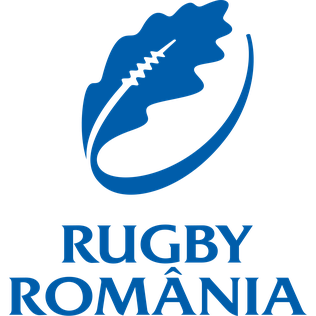
The Romania national rugby union team represents the Romanian Rugby Federation in men's international rugby union competitions. Nicknamed Stejarii, the team is long considered one of the stronger European teams outside the Six Nations. They have participated in all but one Rugby World Cup and currently compete in the first division of the European Nations Cup, which they won in 2017. Rugby union in Romania is administered by the Romanian Rugby Federation.

The Russia national rugby league team, nicknamed The Bears, represents Russia in international rugby league tournaments and other rugby league fixtures. The Bears, played their first fixtures against two British club sides: York Wasps and Fulham RLFC. In 2013, Russia became a full member of the Rugby League International Federation.

The Afghanistan national football team is the national football team of Afghanistan and is controlled by the Afghanistan Football Federation. Founded in 1922, they played their first international game against Iran in Kabul, 1941. Afghanistan then joined FIFA in 1948 and the AFC in 1954, as one of the founding members. They play their home games at the Ghazi National Olympic Stadium in Kabul, the capital of Afghanistan. In 2013, Afghanistan won the 2013 SAFF Championship and earned the "FIFA Fair Play Award". Afghanistan has never qualified for the AFC Asian Cup.

Football in Australia refers to numerous codes which each have major shares of the mainstream sports market, media, broadcasting, professional athletes, financial performance and grassroots participation: Australian rules football, rugby league, rugby union and soccer. There are four pre-eminent professional football competitions played in Australia: the Australian Football League, the National Rugby League, Super Rugby and the A-League (soccer). By most measures, including attendance, television audience and media presence across the most states, Australian football is the most popular nationally. However, in the states of New South Wales and Queensland, rugby football is overall the most watched and receives the most media coverage, especially the Rugby League State of Origin contested between the two states referred to as “Australian sport's greatest rivalry”. In recent times, there has been an increase in popularity in Australian football and corresponding decrease in popularity of Rugby union in New South Wales and Queensland. Soccer, while extending its lead in participation rate, particularly in the large cities, and improving its performance at the FIFA World Cup and at the FIFA Women's World Cup, continues to attract the overall lowest attendance, as well as media and public interest, of the four codes.
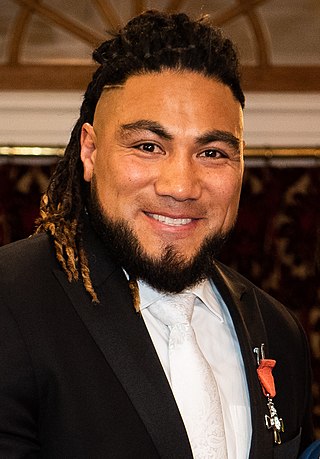
Ma'a Allan Nonu is a professional rugby union player from New Zealand who currently plays for the San Diego Legion in Major League Rugby (MLR). He plays in the inside centre, but can also cover outside centre and wing.

Rugby union in Australia has a history of organised competition dating back to the late 1860s. Although traditionally most popular in Australia's rugby football strongholds of New South Wales, Queensland and the ACT, it is played throughout the nation.
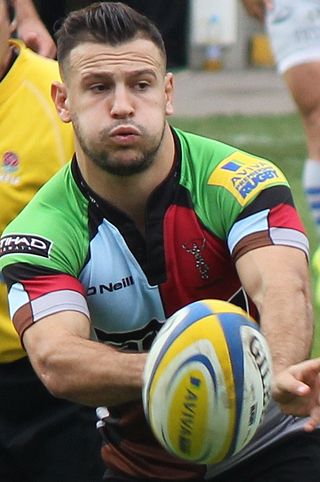
Daniel Stuart Care is an English professional rugby union player who plays as a scrum-half for Premiership Rugby club Harlequins and the England national team.

The IRB2015 Rugby World Cup was the eighth Rugby World Cup, the quadrennial rugby union world championship. The tournament was hosted by England from 18 September to 31 October. Of the 20 countries competing in the World Cup in 2011, there was only one change: Uruguay replaced Russia. This was the first World Cup with no new teams to the tournament.
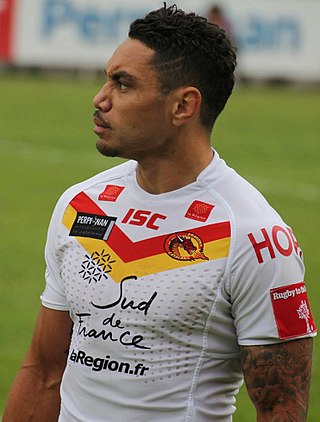
Villiami Sione "Willie" Tonga, also known by the nickname of ”Willie", is an Australian former professional rugby league footballer who last played for the Leigh Centurions in the Super League. An Australia international and Queensland State of Origin representative centre, he previously played for the Parramatta Eels, the Canterbury-Bankstown Bulldogs, with whom he won the 2004 NRL Premiership, and the North Queensland Cowboys. He joined French club the Catalans Dragons in 2015 and signed a contract with the Centurions for 2016.

The Russia national rugby union team, nicknamed Medvedi, represented Russia in men's international rugby union international competitions. The team is administered by the Rugby Union of Russia (RUR). The RUR is considered the official successor union of the Soviet Union by World Rugby and the combined CIS team which played in the early 1990s. Since 1992, the team has played as Russia. Its first test match as Russia was against the Barbarians in Moscow in June 1992 and the country's first test against an official Test nation was against Belgium later that same year.

Cory Steven Jane is a New Zealand international rugby union player.

Max-Alain Gradel is an Ivorian professional footballer who plays as a winger for Turkish Süper Lig club Gaziantep and captains the Ivory Coast national team.
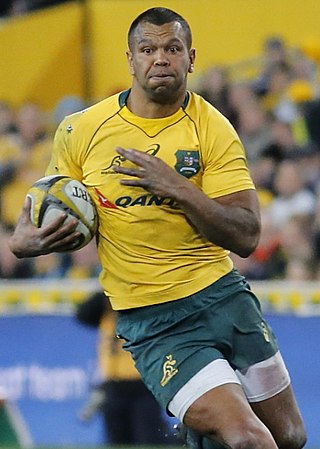
Kurtley James Beale is an Australian professional rugby union representative player who has made over 90 national representative appearances in a ten-year playing career at the world-class level. He is of Aboriginal descent, has had a long Super Rugby career with the New South Wales Waratahs and has played for the Melbourne Rebels and the Wasps club in England. Beale usually plays at full-back or centre but can play fly-half or winger. In 2011 Beale received the John Eales Medal, awarded to Australian rugby's Player of the Year.
The France women's national rugby union team represents France in women's international rugby union. They played the first-ever women's rugby union test match against the Netherlands on 13 June 1982. They compete annually in the Women's Six Nations Championship and have placed third in seven of nine Rugby World Cup's.

Rugby union is a popular sport since its introduction by British military personnel in the 19th century.
Sport in Sri Lanka is a significant part of Sri Lankan culture. Although the Sports Ministry named volleyball the national sport, the most popular sport is Cricket. Rugby union is also popular. Other popular sports are water sports, badminton, athletics, football, basketball and tennis. Sri Lanka's schools and colleges regularly organize sports and athletics teams, competing on provincial and national levels.
























